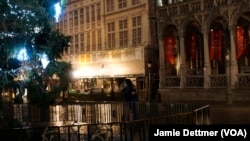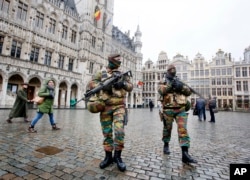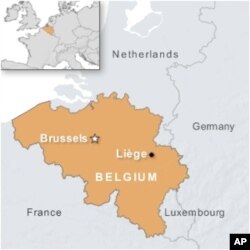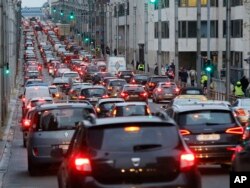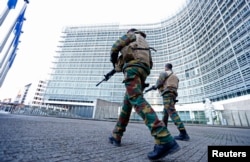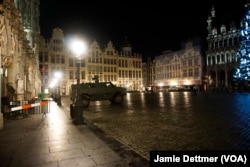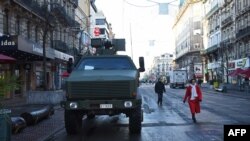By an illuminated Christmas tree in a normally tourist-clogged Grand Place, a couple embrace.
They are the only ones out this evening in one of Europe’s historic squares. Aside from soldiers huddled inside their armored vehicle this cold November night, no one else is around.
Two streets away in the Belgian capital, a couple of camouflaged and flak-jacketed soldiers accompanied by a policeman walk past a restaurant, one of the few open near Grand Place, where some Japanese tourists are tucking into platefuls of traditional Brussels fare – mussels and fries.
The tourists appear to be talking very loudly but maybe it is just the quiet in the street that makes their conversation seem noisier.
New normal developing
Welcome to Brussels – the capital not only of Belgium but the administrative center of a European Union that is being dragged unwillingly into a new normal when it comes to security.
Brussels awoke to a fourth day of a security lockdown Tuesday with most shops in the center still shuttered, schools closed and public transport severely restricted. Belgian officials said schools may be allowed to open Wednesday but possibly in stages.
From the center of Brussels to migrant-dominated outlying districts like Molenbeek, where at least three of the Islamic militants who carried out the November 13 terror attacks in Paris lived, to Liege, birthplace of Emperor Charlemagne, who united most of western Europe in the Middle Ages, the hunt is on for an Islamic militant network Belgian officials fear is planning attacks similar to those that struck the French capital.
The principal suspect is 26-year-old Paris attacker Salah Abdeslam – the bomber who appeared to have had last-minute qualms and failed to detonate his suicide vest – but so far he has remained elusive and may have escaped the clutches of security forces by speeding through a police cordon near Liege a few days ago, according to unconfirmed local media reports.
Terror threat
Even if Abdeslam is captured and a separate terror network of possibly up to eight militants is rounded up, the threat of terrorism will not have been removed from Belgium – or from Europe.
European counterterror officials estimate at least 5,000 Europeans have joined jihadists in Syria. Some analysts put the figure much higher, possibly double. Hundreds have returned.
At least 516 Belgians went off at some point or other to fight in Syria and at least 120 have returned, Pieter Van Ostaeyen, an analyst on Islamic extremism, said.
In terms of population size, Belgium is “by far the European nation contributing the most to the foreign element in the Syrian war,” Van Ostaeyen said.
Despite assurances from leaders such as French President Francois Hollande and Belgian Prime Minister Charles Michel that regular life will resume shortly, few here in the Belgian capital said they believe life will be quite the same for a very long time.
Felt more secure
Nor do Parisians, for all their grim defiance and determined insouciance since the terror attacks in the French capital on November 13.
“I came here 20 years ago,” says Nadia, a middle-aged Romanian who has made a successful life for herself in Brussels. “I came because I thought it would be a more secure place than other towns in Europe. It is the capital of Europe, but now I don’t know.” Her voice trailed off.
Nearly a half-century ago, the British government deployed the military on the streets of Belfast after days of sectarian rioting.
It was meant to be just a short-term mission to restore order, but it lasted for another 29 years.
That deployment is the nearest comparison in recent European history, aside from full-blown civil war in the Balkans, to the scale of security operations under way in Belgium and France now.
Brussels, Paris and Rome, where the military has also been deployed amid security alarms and dire threats from the Islamic State group, will no doubt soon see the more overt signs of counterterrorism off their streets.
The troops and armored vehicles will be recalled to barracks – Belgium’s prime minister said Monday, possibly in a week’s time – but the security ante has been raised.
Freedoms once cherished are being discarded, as authorities ready for the next phase in what they admit will be a prolonged struggle with Islamic State militants.
Intelligence needs
Intelligence services and police forces are demanding more powers and more personnel, looser rules on data collection and an easing of regulations governing house searches and raids.
Security experts say they will need this and more, especially when it comes to increased personnel.
Jean-Charles Brisard, director of the Paris-based Center for the Analysis of Terrorism, warned the “intelligence services are just being overwhelmed.”
Brisard points out France has more than 6,000 jihadist suspects documented and just 3,200 intelligence officers to monitor them.
Belgian officials said they have 800 “Tier One” suspected jihadists but just 1,000 civilian and military intelligence officers to counter any threat they might pose.
And they are facing in some circumstances not only battle-hardened militants, but foes who are becoming more skilled in evading electronic surveillance, from using files they have encrypted themselves to communicating via video gaming platforms and using prepaid cell phones.
Battlefield tactics
The operational sophistication the terrorists displayed in Paris with simultaneous attacks far from the battlefields of Syria and Iraq has jarred a continent already at a loss about what to do with the huge refugee influx from the Middle East and Africa and still struggling with the economic fallout from the 2008 financial crash.
The rising threat of radical Islamic terrorism, disaffected Muslim populations and open borders, along with a refugee and migrant crisis, are creating a perfect storm for Europe, which some analysts fear the continent is ill-suited to weather.
To do so will require a new security normal.
This includes improved information sharing among Europe’s intelligence agencies, the kind of broader data collection European leaders condemned the U.S. for conducting and more intrusive policing, say analysts.
The trick, though, will be to pull all of that off without stigmatizing Muslims and losing too many of the precious liberties that make Europe what it is.
“Europeans need to fight extremism and combat radicalization,” said Marietje Schaake, a Dutch liberal politician and lawmaker in the European Parliament.
“There is a lot of room for better cooperation in Europe," Schaake said. "Yet, knee-jerk responses that single out groups or erode freedoms and rights for all will come back as a boomerang."
Intrusive measures
For the Belgians, even with the intrusive security measures the past four days, the government has few results to boast of in terms of militants netted or explosives and weapons seized.
Twenty people have been detained since the lockdown began Saturday, but the federal prosecutors’ office said 17 have been released.
On Friday night, police found an automatic weapon and equipment, often used to make explosive suicide vests, during a raid on an apartment in Molenbeek; but since then, authorities have not reported seizing any other weaponry.
Three people have been charged for aiding Abdeslam to flee Paris and re-enter Belgium and one man arrested Sunday has been charged with offenses in connection with the Paris attacks.
Nothing, however, has been reported by authorities about any other terror network planning attacks in Belgium.
“We are very alert. The potential targets remain commercial centers and streets and public transport,” Prime Minister Michel told reporters at a news conference Monday night. “No one is happy with the situation."




